#So i just started from scratch
Explore tagged Tumblr posts
Text
My 2024 in Star Trek!
There are probably a few episodes I missed - I completely forgot about keeping track of this until September this year! - but thanks to Netflix I've found most of my history, so here's this year's update on how much Trek I watched...
Totals
Total amount of Trek watched in 2024: 266 hours, made from 364 episodes across 26 different seasons (and 2 movies)
Total amount of Trek watched ever: 964 hours made from 1280 episodes across 47 different seasons (and 23 movies).
Percentage of Star Trek watched so far: 95.5% Percentage of Star Trek re-watched: 43% (Out of the Trek I’ve watched, not *all* Trek)
Overview of series watched in 2024:
VOY - 88 hours - 4 seasons, 13 episodes DS9 - 40.5 hours - 1 season, 17 episodes; + 11 episodes TOS - 40 hours - 1 season, 17 episodes ENT - 36.5 hours - 2 seasons, 2 episodes PIC - 23 hours - 3 seasons PRO - 16 hours - 2 seasons LD - 9.5 hours - 2 seasons, 2 episodes + 1 episode DIS - 8 hours - 1 season TNG - 4.5 hours - 1 episode + 2 films
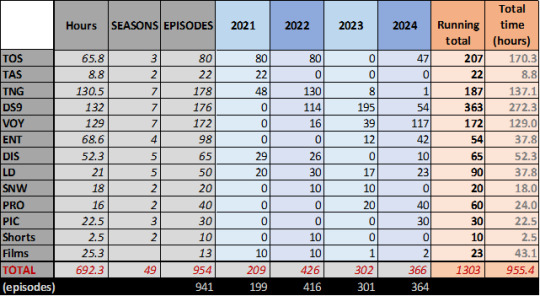
Monthly Log:
January: 7 episodes = 5 hours > DS9 s6e11-e17 (7)
February: 27 episodes = 19 hours > Ds9 s6e18-s7e18 (27)
March: 16 episodes = 12 hours > DS9 s7e19-e26 (8) > TOS s1e0-e7 (8)
April: 19 episodes = 9 hours > TOS s1e8-e15 (8) > DS9 s4e23 (1) > PRO s1e1-10 (10)
May: 18 episodes = 15 hours > TOS s1e16-s2e4 (18)
June/July: 10 episodes = 8 hours > TOS s2e5-14 (10)
August: 55 episodes = 34 hours > PRO s2e1-20(20) > VOY s3e14-s4e9 (22) > DIS s5e1-10(10) > DS9 s1e2-3 (2) > LD s4e2 (1)
September: 44 episodes = 27 hours > DS9 s3e7, e11-13, s5e16, s1e4 (6) > VOY s4e10-s6e04 (21) > LD s1e1-7 (7) > PRO s1e11-20 (10)
October: 87 episodes, 2 movies = 67 hours > VOY s6e05-s7e25 (46) > LD s1e8-9, s5e1-3 (5) > PIC s1-s3 (30) > ENT s1e12-e17 (6) > Insurrection + Nemesis
November: 34 episodes = 23 hours > DS9 s2e5 (1) > LD s1e10, s5e4-7 (5) > TOS s2e15-17 (3) > TNG s2e7 (1) > ENT s1e18-s2e16 (24)
December: 18 episodes = 12 hours > LD s2e1-2, s5e8-10 (5) > DS9 s2e23 (1) > ENT s2e17-s3e2 (12)
#trek year count#I have spent so much time crunching numbers today#I had a spreadsheet with my workings-out from last year#But it was *not* a good spreadsheet#Honestly with the way I'd been labelling it was barely intelligible#So i just started from scratch#But hey maths is fun!#I definitely feel like I must have got *something* wrong#but hey ho#this is fairly accurate#Only 44 episdoes left until I'm fully caught up!! :o#wsb#trek maths#trek nerding
9 notes
·
View notes
Text
i NEED to draw her more shes so awesome

reading the team up missions inspired me..
#mha#bnha#my hero academia#rumi usagiyama#mirko#mha mirko#pike art#honestly i jate a lot of the stuff on my blog rn#so only solution is to of course draw more !#i have a bad habit of just. deleting accounts and starting from scratch any time i have big art improvements#i wont do that again.. hopefully
571 notes
·
View notes
Text
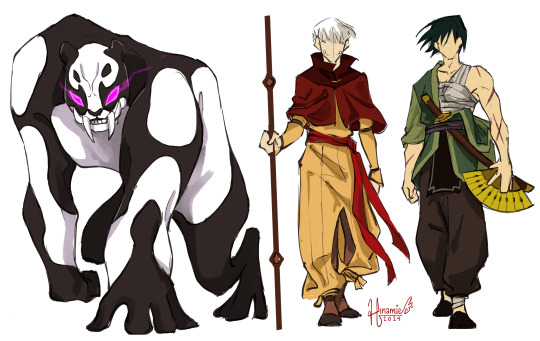
second years designs :D only have a few more characters left to do this has gone so quick ,,
jjk atla!au with @philosophiums
#my art#jujutsu kaisen#jjk#jjk atla!au#inumaki toge#panda jjk#maki zenin#fanart#jjk fanart#lmhs#atla!au: art#atla!au: design#looks at maki............looks at maki harder..............continues looking at maki.....#she.......i believe tht Women....#short circuiting she is SO . god. im#i feel wlw in this chilis tonight#i love inumaki's design also but lets be real abt who th real star of this page is#shakes self out of Gay Stupor anyway#i only designed panda's spirit form bc out of it he is...Just A Panda...i think i can get away with not drawing Just A Panda#also it was a nice mildly stimulating challenge combining his gorilla mode form w hei bai#very kind of atla to Already have a panda spirit FHJJH saves me a lot of headache#like dont get me wrong i love feeling things out n Making my own spirit designs like w mahito#but starting from scratch sure takes a lot of brainpower hh so sometimes its nice having most of the work alr done for u
504 notes
·
View notes
Text
patience being tested. being forced by a bizarre unfortunate situation to adhere to university requirement technicality by taking this simple basic elementary "introduction to environmental history" class.
this class is from facilitators/program which do, like, "history of the American frontier" or "history of fishing and hunting" and still basically subscribe to that old-school twentieth-century idealization and celebration of characters like Teddy Roosevelt and reverence for a mythical arc-of-history-bent-towards-justice narrative of the often-clumsy but ultimately-benevolent US federal government and its mission to "save nature" through the miracle of "sustained yield," while heroic federal land management agencies and "heritage" institutions lead to way, staffed by exceptional individuals (appeals to nostalgia for the frontier and an imagined landscape of the American West; ego-stroking appeals to flattering self-image that center the environmentalist or academic). where they invoke, y'know, ideas like "ecology is important because don't you enjoy cross-country skiing in The Woods with your niece and nephew? don't you like hunting and fishing?" which makes it feel like a time capsule of appeals and discourses from the 1970s. and it invokes concept of "untouched wilderness" (while eliding scale of historical Indigenous environmental relationships and current ongoing colonial violence/extractivism). but just ever-so-slightly updated with a little bit of chic twenty-first-century flair like a superficial land acknowledgement or a reference to "labor histories" or "history from below," which is extra aggravating when the old ideologies/institutions are still in power but they're muddying the water and diluting the language/frameworks (it's been strange, watching words like "multispecies" and "Anthropocene" over the years slowly but surely show-up on the posters, fliers, course descriptions, by now even appearing adjacent to the agri-business and resource extraction feeder programs, like a recuperation or appropriation.) even from a humanities angle, it's still, they're talking at me like "You probably didn't know this, but environmental history is actually pretty entangled with political and social events. In fact, we can synthesize sources and glean environmental info from wacky places like workers' rolls in factories, ship's logs, and poetry from the era." and i'm nodding like YEP.
the first homework assignment is respond to this: "Define and describe 'the Anthropocene'. Do you think 'the Anthropocene' is a useful concept? Why or why not?" Respond in 300 words.
so for fun, right now in class, going to see how fast i can pull up discussion of Anthropocene-as-concept solely from my old posts on this microblogging site.
---
ok, found some
---
I think that the danger in any universal narrative or epoch or principle is exactly that it can itself become a colonizing force. [...] I’m suspicious of the Anthropocene as concept for the very reason that it subsumes so many peoples, nations, histories, geographies, political orders. For that reason, I think ideas like the Anthropocene can be a useful short-hand for a cluster of tangible things going on with the Earth at the moment, but we have to be very careful about how fluid and dynamic ideas become concretized into hegemonic principles in the hands of researchers, policymakers, and politicians. There’s so much diversity in histories and experiences and environmental realities even between relatively linked geographies here in Canada [...]. Imagine what happens when we try to do that on a global scale - and a lot of euro-western Anthropocene, climate change and resilience research risks doing that - eliding local specificities and appropriating knowledge to serve a broader euro-western narrative without attending to the inherent colonial and imperial realities of science and policy processes, or even attending to the ways that colonial capitalist expansion has created these environmental crises to begin with. While we, as a collective humanity, are struggling with the realities of the Anthropocene, it is dangerous to erase the specific histories, power-relations, political orders that created the crisis to begin with. So, I’m glad that a robust critique of the Anthropocene as a concept is emerging.
Text by: Words of Zoe Todd, as interviewed and transcribed by Caroline Picard. “The Future is Elastic (But it Depends): An Interview with Zoe Todd.” 23 August 2016.
---
---
---
The Great Acceleration is the latest in a series of human-driven planetary changes that constitute what a rising chorus of scientists, social scientists, and humanists have labeled the Anthropocene - a new Age of Humans. [...] But what the Anthropocene label masks, and what the litany of graphs documenting the Great Acceleration hide, is a history of racial oppression and violence, along with wealth inequality, that has built and sustained engines of economic growth and consumption over the last four centuries. [...] The plantation, Sidney Mintz long ago observed, was a “synthesis of field and factory,” an agro-industrial system of enterprise [...]. Plantation legacies, along with accompanying strategies of survival and resistance, dwell in the racialized geographies of the United States’ and Brazil’s prison systems. They surface in the inequitable toxic burdens experienced by impoverished communities of color in places like Cancer Alley, an industrial corridor of petrochemical plants running along the Mississippi River from New Orleans to Baton Rouge, where cotton was once king. And they appear in patterns of foreign direct investment and debt servitude that structure many land deals in the Caribbean, Brazil, and sub-Saharan Africa [...]. [C]limatologists and global change scientists from the University of London, propose instead 1610 as a date for the golden spike of the Anthropocene. The date marked a detectable global dip in carbon dioxide concentrations, precipitated, they argue, by the death of nearly 50 million indigenous human inhabitants [...]. The degradation of soils in the tobacco and cotton-growing regions in the American South, or in the sugarcane growing fields of many Caribbean islands, for example, was a consequence of an economic and social system that inflicted violence upon the land and the people enslaved to work it. Such violent histories are not so readily evident in genealogies that date the Anthropocene’s emergence to the Neolithic Revolution 12,000 years ago, the onset of Europe’s industrial revolution circa 1800, or the Trinity nuclear test of 1945. Sugarcane plantations were already prevalent throughout the Mediterranean basin during the late middle ages. But it was during the early modern era, and specifically in the Caribbean, where the intersection of emerging proto-capitalist economic models based on migratory forced labor (first indentured servitude, and later slavery), intensive land usage, globalized commerce, and colonial regimes sustained on the basis of relentless racialized violence, gave rise to the transformative models of plantations that reshaped the lives and livelihoods of human and non-human beings on a planetary scale. [...] We might, following the lead of science studies scholar Donna Haraway and anthropologist Anna Tsing, more aptly designate this era the Plantationocene. [...] It is also an invitation to see, in the words of geographer Laura Pulido, “the Anthropocene as a racial process,” one that has and will continue to produce “racially uneven vulnerability and death." [...] And how have such material transformations sustained global flows of knowledge and capital that continue to reproduce the plantation in enduring ways?
Text by: Sophie Sapp Moore, Monique Allewaert, Pablo F. Gomez, and Gregg Mitman. "Plantation Legacies." Edge Effects. 22 January 2019. Updated 15 May 2021. [Bold emphasis added by me.]
---
---
---
Geologists and other scientists will fight over [the definition of the beginning start-date of the Anthropocene] in scientific language, seeking traces of carbon dioxide that index the worst offenses of European empire which rent and violated the flesh, bodies, and governance structures of Indigenous and other sovereign peoples in the name of gold, lumber, trade, land, and power. [...] The stories we tell about the origins of the Anthropocene implicate how we understand the relations we have with our surrounds. In other words, the naming of the Anthropocene epoch and its start date have implications not just for how we understand the world, but this understanding will have material consequences, consequences that affect body and land.
Text by: Heather Davis and Zoe Todd. On the Importance of a Date, or Decolonizing the Anthropocene. ACME An International Journal for Critical Geographies. December 2017. [Bold emphasis added by me.]
---
---
---
From Aime and Suzanne Cesaire, C. L. R. James, Claudia Jones, Eduoard Glissant, through Sylvia Wynter, Christina Sharpe, and so many others, critical anticolonial and race theory has been written from the specific histories that marked the Black Atlantic. [...] Glissant also reminds us, secondly, of how cunning the absorptive powers of [...] liberal capitalism are - how quickly specific relations are remade as relations-erasing universal abstractions. [...] This absorptive, relations-erasing universalism is especially apparent in some contemporary discourses of […] liberalism and climate collapse - what some call the Anthropocene - especially those that anchor the crisis in a general Human calamity which, as Sylvia Wynter has noted, is merely the name of an overdetermined and specific [White] European man. […] [T]he condition of creating this new common European world was the destruction of a multitude of existing black and brown worlds. The tsunami of colonialism was not seen as affecting humanity, but [...] these specific people. They were specific - what happened to them may have been necessary, regrettable, intentional, accidental - but it is always them. It is only when these ancestral histories became present for some, for those who had long benefitted from the dispossession [...], that suddenly the problem is all of us, as human catastrophe.
Text by: Elizabeth Povinelli. “The Ancestral Present of Oceanic Illusions: Connected and Differentiated in Late Toxic Liberalism.” e-flux Journal Issue #112. October 2020.
---
The narrative arc [of White "liberal humanism"] [...] is often told as a kind of European coming-of-age story. […] The Anthropocene discourse follows the same coming-of-age [...] script, searching for a material origin story that would explain the newly identified trajectory of the Anthropos […]. Sylvia Wynter, W.E.B. DuBois, and Achille Mbembe all showed how that genealogy of [White subjecthood] was [...] articulated through sixteenth- through nineteenth-century [historiographies and discourses] in the context of colonialism, [...] as well as forming the material praxis of their rearrangement (through mining, ecological rearrangements and extractions, and forms of geologic displacements such as plantations, dams, fertilizers, crops, and introduction of “alien” animals). […] As Wynter (2000) commented, “The degradation of concrete humans, that was/is the price of empire, of the kind of [Eurocentric epistemology] that underlies it” (154).
Text by: Kathryn Yusoff. “The Inhumanities.” Annals of the American Association of Geographers, Volume 11, Issue 3. November 2020.
---
---
---
As Yarimar Bonilla suggests in regard to post-Irma-and-Maria Puerto Rico, “vulnerability is not simply a product of natural conditions; it is a political state and a colonial condition.” Many in the Caribbean therefore speak about the coloniality of disaster, and the unnaturalness of these “natural” disasters [...]. Others describe this temporality by shifting [...] toward an idea of the Plantationocene [...]. As Moore and her colleagues write, “Plantation worlds, both past and present, offer a powerful reminder that environmental problems cannot be decoupled from histories of colonialism, capitalism, and racism that have made some human beings more vulnerable [...].” [W]e see that contemporary uneven socioecologies associated with the rise of the industrial world ["the Anthropocene"] are based [...] also on the racialized denial and foreshortening of life for the sacrificial majority of black, brown, and Indigenous people and their relegation to the “sacrifice zones” of extractive industry. [...] [A]ny appropriate response to the contemporary climate emergency must first appreciate its foundations in the past history of the violent, coercive, transatlantic system of plantation slavery; in the present global uneven development, antiblackness, and border regimes that shape human vulnerability [...] that continues to influence who has access to resources, safety, and preferable ecologies [...] and who will be relegated to the “plantation archipelagoes” (as Sylvia Wynter called them) [...].
Text by: Mimi Sheller. “Thinking Beyond Coloniality: Toward Radical Caribbean Futures.” Small Axe (2021), 25 (2 (65)), pages 169-170. Published 1 July 2021. [Bold emphasis added by me.]
---
---
---
Indigenous genocide and removal from land and enslavement are prerequisites for power becoming operationalized in premodernity [...]; it was/is a means to operationalize extraction (therefore race should be considered as foundational rather than as periphery to the production of those structures and of global space). [...] Wynter suggests that we […] consider 1452 as the beginning of the New World, as African slaves are put to work on the first plantations on the Portuguese island of Madeira, initiating the “sugar-slave” complex - a massive replantation of ecologies and forced relocation of people […]. Wynter argues that the invention of the figure of Man in 1492 as the Portuguese [and Spanish] travel to the Americas instigates at the same time “a refiguring of humanness” in the idea of race. [...] The natal moment of the 1800 Industrial Revolution, […] [apparently] locates Anthropocene origination in […] the "new" metabolisms of technology and matter enabled by the combination of fossil fuels, new engines, and the world as market. […] The racialization of epistemologies of life and nonlife is important to note here […]. While [this industrialization in the nineteenth century] […] undoubtedly transformed the atmosphere with […] coal, the creation of another kind of weather had already established its salient forms in the mine and on the plantation. Paying attention to the prehistory of capital and its bodily labor, both within coal cultures and on plantations that literally put “sugar in the bowl” (as Nina Simone sings) […]. The new modes of material accumulation and production in the Industrial Revolution are relational to and dependent on their preproductive forms in slavery […]. In 1833, Parliament finally abolished slavery in the British Caribbean, and the taxpayer payout of £20 million in “compensation” [paid by the government to slave owners for their lost "property"] built the material, geophysical (railways, mines, factories), and imperial infrastructures of Britain and its colonial enterprises and empire. [...] A significant proportion of funds were invested in the railway system connecting London and Birmingham (home of cotton production and […] manufacturing for plantations), Cambridge and Oxford, and Wales and the Midlands (for coal). Insurance companies flourished [...]. The slave-sugar-coal nexus both substantially enriched Britain and made it possible for it to transition into a colonial industrialized power […]. The slave trade […] fashioned the economic conditions (and institutions, such as the insurance and finance industries) for industrialization.
Text by: Kathryn Yusoff. "White Utopia/Black Inferno: Life on a Geologic Spike". e-flux Journal Issue #97. February 2019. [Bold emphasis added by me.]
#sorry for being mean#instructor makes podcasts about cowboys HELP ME#and he recently won a New Business award for his startup magazine covering Democrat party politics in local area HELP#so hes constantly performing this like dance between new hip beerfest winebar coolness and oldfashioned masculinity#but hes in charge of the certificate program so i have to just shut up and keep my head down for approximately one year#his email address is almost identical to mine and invokes enviro history terms but i made mine long before when i was ten years old#so i could log in to fieldherpforum dot com to talk about enviro history of distribution range changes in local reptiles and amphibians#sir if you read my blog then i apologize ive had a long year#and i cant do anything to escape i am disabled i am constantly sick im working fulltime i have NO family i have NO resources#i took all of this schools graduate level enviro history courses and seminars years ago and ran the geography and enviro hist club#but then left in final semester because sudden hospitalization and crippled and disabled which led to homelessness#which means that as far as any profession or school is concerned im nobody im a retail employee#i was doing conference paper revisions while sleeping on concrete vomiting walking around on my cane to find outdoor wifi#and im not kidding the MONTH i got back into a house and was like ok going back to finish the semester the school had#put my whole degree program and department in moratorium from lack of funding#and so required starting some stuff from scratch and now feel like a hostage with debt or worsening health that could pounce any moment#to even get back in current program i was working sixteen hours a day to pay old library fines and had to delicately back out of workplace#where manager was straight up violently physically abusive to her vulnerable employees and threatened retaliation#like an emotional torturer the likes of which i thought existed only in cartoons#and the week i filed for student aid a massive storm had knocked out electricity for days and i was clearing fallen tree debris#and then sitting in the dark in my room between job shifts no music no phone no food with my fingers crossed and i consider it a miracle#sorry dont mean to dramatize or draw attention to myself#so actually im happy you and i are alive
134 notes
·
View notes
Text











Say hello to my horrible little triangle! He is the reason I haven't had time to draw for like a week 💙
...He watches me while I sleep now! :)
#handmade from scratch babyyyy. 1 basic prototype & then BOOM the process was fuck it we ball from start to finish xD#maybe ford comic con cosplay / face reveal in a future post#Tumblr's reblogging system is very cool but also means you can literally never delete anything ever so I'm hesitant to post my face lol#definitely will try to do a better Bill shoot. This was just a last minute thing cause I found 3d glasses. hence the unironed white sheet#Thought I could make him suffer a bit <3 Exposure therapy yknow <3 (He currently sitting with them in his lap. He might kill me in my sleep#gravity falls#GF#Gravity Falls Bill#Bill Cipher#cosplay#plushies#plushy making#articulate doll#sewing crafts#tbob#book of bill spoilers (I think?? or is it thisisnotawebsite spoilers ...something to that effect)#fanwork#artists on tumblr#my art
256 notes
·
View notes
Text
Favourite pre-timeskip Sanji moments
These are a few of my favourite pre ts sanji moments
(1) Baratie arc when sanji served fresh food for don krieg despite everyone telling him that krieg was notorious for betraying people. Sanji still served the food because of his value of "feeding the hungry no matter what"

(2) Sweet sanji preparing bentos for Luffy vivi and a special drink for Vivi's duck karoo so they can go explore the little garden island. Also packing and tying the lunches for the kids (luffy and karoo) by himself

(3) water 7 Sanji following his principle of "never waste food" while fighting CP7's ramen guy wanze (who had a full ramen armour and sanji cut his armour up and served the ramens all in different plates around the kitchen)

(4) thriller bark Sanji holding an unconscious nami up so she won't get injured while he takes all the hits from Absalom He's not just a simp, he genuinely cares for nami

(5) water 7 Sanji smoking a cigarette while spying and finding out sensitive government information

(6) Post enies lobby filler sanji crying throwing up stressing over finding out the right spices of a fried rice. He is a true chef at heart and has so much love for his craft

(7) post skypiea filler G-8 arc sanji when someone says he is better than all of the navy chefs and sanji cutely offers to give his recipes to them. He is so cute kind and humble

(8) sabaody sanji kicking the Celestial dragon knowing what'll happen and not giving a fuck anyway
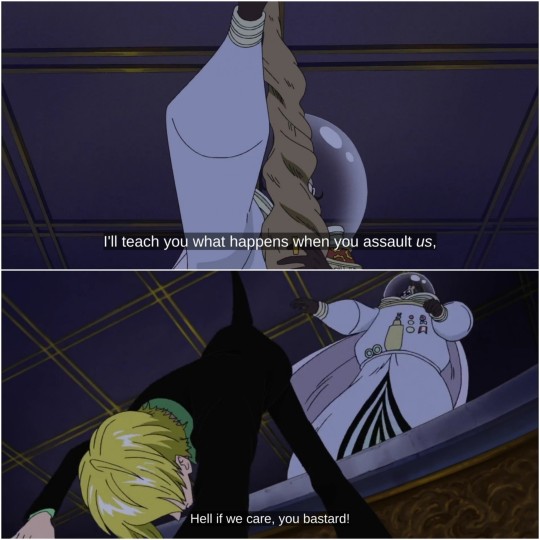
(9) skypiea sanji being all big smiles and happy while showing conis the bento he has arranged for her and telling them how arranging food is an art (look at the little winged angel he put there as a representation for conis who has wings)

(10) Sanji leaving a message for nami in water 7, even in the dire situation they were in (usopp left, robin was abducted, they were all accused of murder) sanji being his usual cute loser self

#honestly scratch this. every sanji moment is my favorite moment#these are the moments that arent as big or as talked about as ie. thriller bark or enies lobby sanji#it's about time we all come together to acknowledge and appreciate how charming perfect beautiful sanji is#i love sanji so much and it was hard choosing just 10. I'll soon start making favourite sanji moments thread for individual arcs#anyway lol#black leg sanji#one piece sanji#vinsmoke sanji#kuroashi no sanji#sanji#one piece#im currently watching Dressrosa and can yall tell i miss sanji so much#i miss him so much that i put everything on hold to finish Dressrosa and zou quickly so i can finally see him again#everyone: honey hes an anime character he's just one click away#me : *soft thump of my forehad against the window sill* when will my husband be back from the war#sanji moments
192 notes
·
View notes
Text
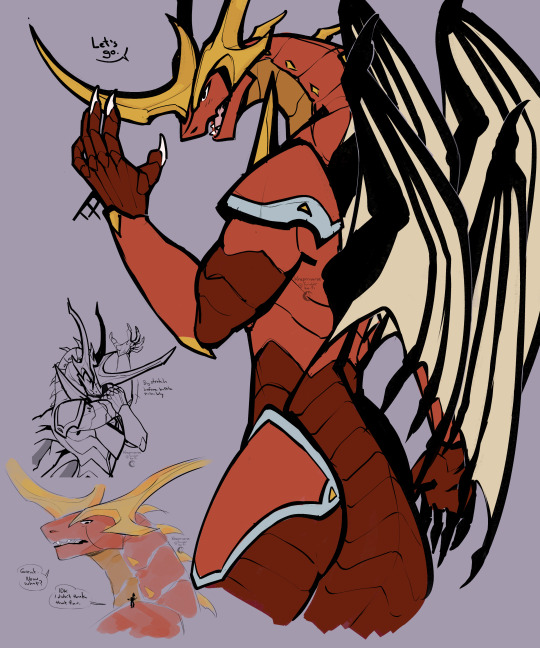
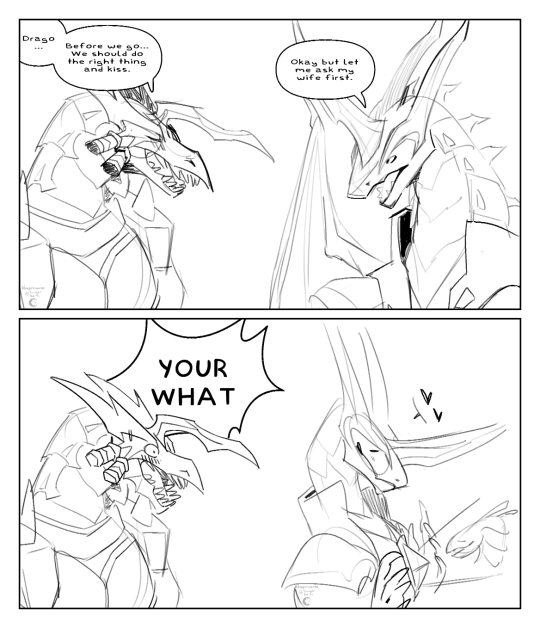
Sorry for non-loz content today but sometimes I fall back into my childhood hyperfixation and have the urge to draw Drago (and sometimes helios)
#bakugan#dragonoid#helios#wavern#kheprriart#thinking ab how wavern is always with him... makes me so sad ilysm wavern#blame the pookie for bakugan posts. weve been watching the show from the start and we're almost done with season 1#just getting ahead of myself and drawing my fav drago evo again#also i love how helix drago has a shirt collar that makes him match dan's jacket. its so fucking cute ty helix drago#also for those who arent aware since this isnt a bakugan blog lumino drago IS built like that 1st image i promise.#i dont normally ship the gans but theres smth ab drago and wavern and helios and drago that scratch that perfect itch
178 notes
·
View notes
Text
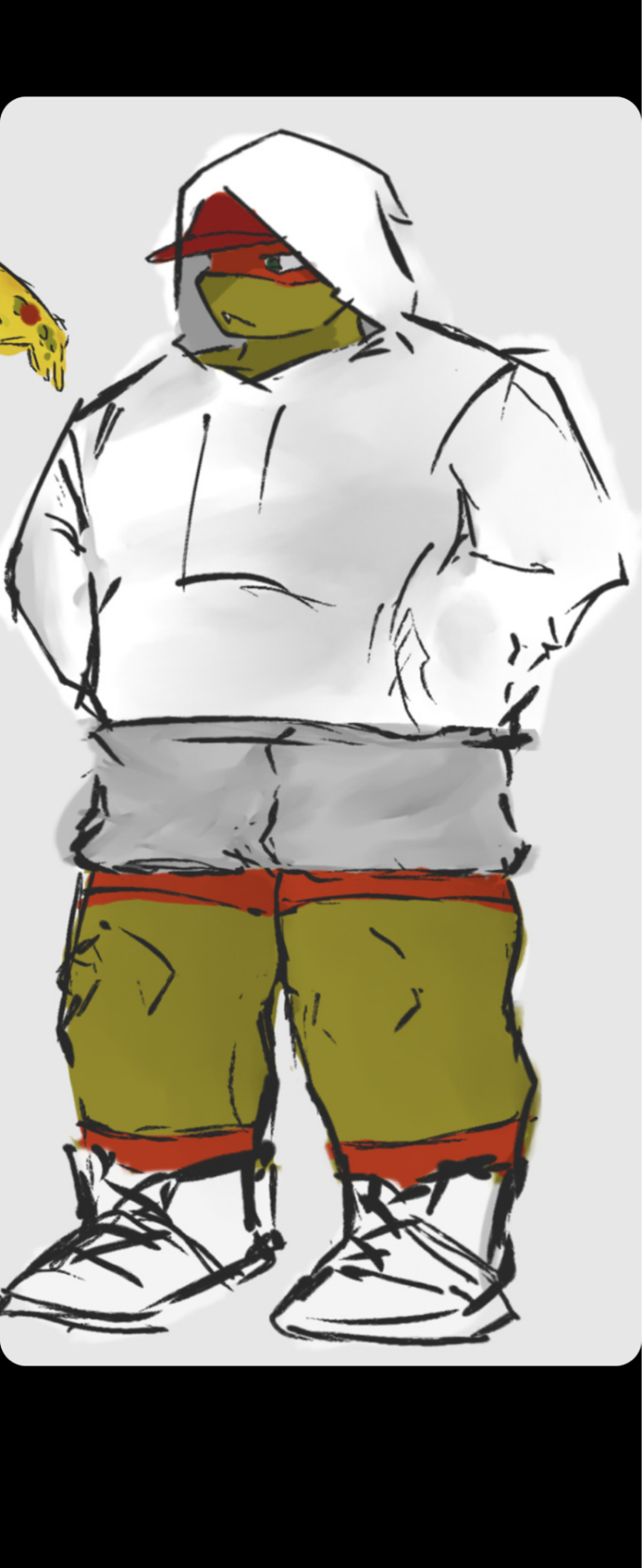
#rottmnt raph#rottmnt#rise of the teenage mutant ninja turtles#my art#teenage mutant ninja turtles#tmnt#save rise of the tmnt#i like looking at this#i want a better art stule tho#there a few ppl and when i look at their drawing im like i wana be thatttt#i wroye a style analysis on myself ish and was gon a properly compare it yo others ppl that i like#but i had yo replace my ipad so i have to start from scratch#linjng up and importing all the images was a fukin painnn nnnn ugh and ill have to do it all over again#ill just try to recreate art i like#ive done that a frw times
113 notes
·
View notes
Text
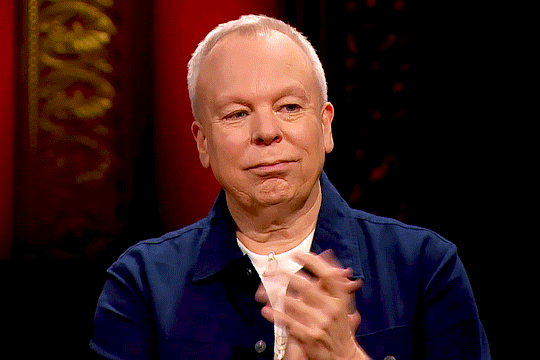
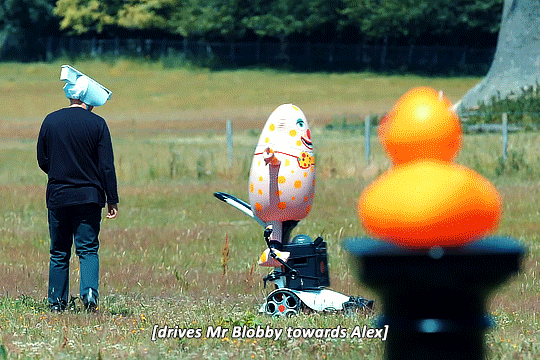
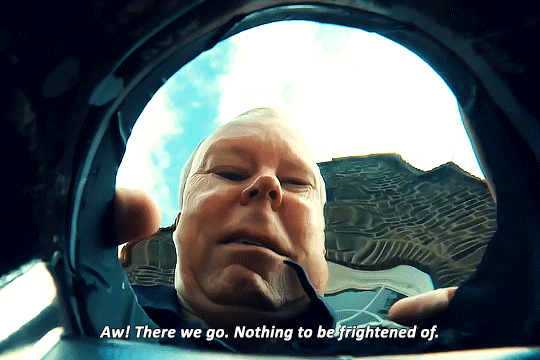


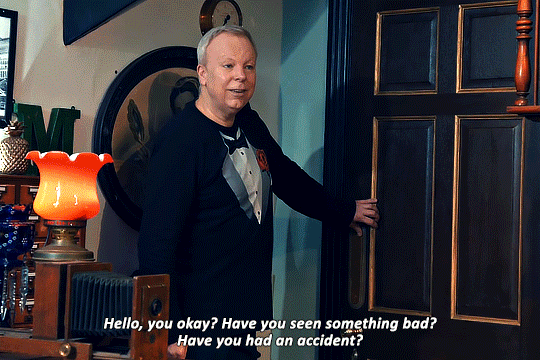


STEVE PEMBERTON Taskmaster 17x03 ’Some impropriety.'
#taskmaster#taskmasteredit#steve pemberton#gif#turns out it's really hard to start giffing again from scratch#so i've forgotten how to sharpen and colour#anyway i just think he's neat#taskmaster spoilers
256 notes
·
View notes
Text
They’re so smug about teasing the angry orca man I love it!
Enemies to lovers and big women/y/n my biggest weakness!!!!!!!!
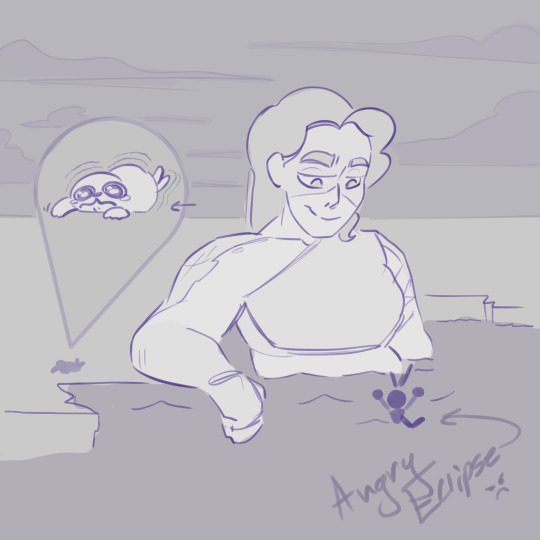
Had to draw this scene from @naffeclipse ‘s eating krill au with humpback y/n and orca eclipse >:)
(I know this isn’t the actual size ratio but it was funnier for the bit i had to!)
#I just know that seal stayed away from the water for a very long time after that#flipping love how this rivalry started with eclipse just wanting to eat his lunch and y/n literally went NOT ON MY WATCH#and the rest was history#now we’ve got ourselves a couple of food thieves#with all of y/n’s scratches you’d think they had a cat or something haha#anywhoooo tags#eating krill au#dca au#humpback y/n#orca eclipse#crunch art#sigh I love them so much
191 notes
·
View notes
Text
what's so interesting is that agatha and nicky clearly had their cons well-oiled, and at the end it seems they even started turning their song into a part of it as well, like i don't think that was the first time nicky sang that song for an audience and they used it to lure witches (i do think it's the first time that it /technically/ didn't work), and how after nicky died it continued to gain popularity and be so well-known it became a legend, and along with that agatha being known as the only survivor of the road and people (like billy) seeking her out to walk it or just for knowledge of it. and i think that had been the idea when they first started using it as a con. making it so they no longer had to travel and scavenge, using it as a lure to bring the witches to them in order to keep nicky alive, but only one small misstep and rio got him anyway
and then thinking about how lorna, who had a generational curse placed upon her family that is going to kill both her and her daughter and who desperately wants to see her daughter survive, heard this song and created her own version to use as a protection spell for her daughter and, like agatha did before her, she made her version so well-known and so popular that years and years after death it's still protecting her daughter, until ultimately her daughter was finally able to use it to break the curse and save herself
idk just.. they're like two sides of the same coin, or distorted mirrors of each other
agathas love was so powerful and so strong that death gave nicky time
lornas love was so powerful and so strong that the ballad gave alice time and even freed her
if nicky hadnt been taken that night, could it have eventually freed him as well? rio said agatha used the dark magic of the darkhold to hide herself from rio, so was that the end goal? they'd continue to lure witches to both keep nicky alive and to have agatha become powerful enough to forever keep them hidden?
#agatha all along#aaa spoilers#agatha harkness#nicholas scratch#alice wu gulliver#lorna wu#txt#me before the finale: and i'll save this song to use the lyrics to make gifsets of agatha x rio since i'll finally have more scenes to use#me after the finale: lorna/alice and agatha/nicholas parallels let's goooo#and there's something so poetic about how alice died too#like the song worked for her in ways it could never have worked for nicky#the song saved her like it never could nicky and like it was supposed to for nicky#and ultimately she dies the same as all the witches who had been drained to keep nicky living#do you think instead of just a loss of control agathas grief and bitterness chose to take from alice#because why should what was meant to save nicky save her instead?#i wonder if that moment when she watches it fizzle does she think of lorna?#does hearing nicky's voice allow her to see the similarities from a different perspective instead of through her grief#through her love of her son and connect it to lorna's love of her daughter? their struggle was the same for as much as it was different#idk it's just... agatha was planning to drain them from the start#why was /this/ one different. why did she have that look on her face after#especially after being confronted with her own mother who would have seen her die
54 notes
·
View notes
Text
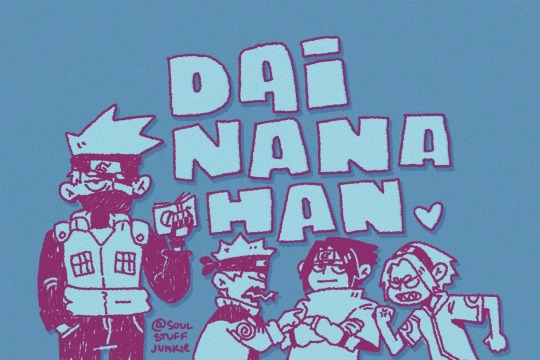
Y’all are not going to believe what hole I’ve found myself back in 😭😭😭😭
[ID: The words 'Dai Nana Han' are written in blocky letters under which stand an exasperated looking Kakashi who's holding up his Icha Icha book, while Naruto, Sasuke and Sakura argue beside him]
#help#I just wanted to do a quick doodle to procrastinate on my freelance work#it doesn’t help that I’ve started rewatching naruto from scratch in the hopes of actually finishing it this time#the zabuza and chuunin exam arcs are SO good???od?#can’t believe I was given a lethal dose of ACTUAL CRACK COCAINE at the tender age of 14 no wonder I turned out like this#my art#soulstuffjunkie#dai nana han#team seven#naruto fan art#kakashi#sasuke#Sakura#naruto
107 notes
·
View notes
Text


meow ₍^⸝⸝> ·̫ <⸝⸝ ^₎
(redraw of this panel ↓)

#enartchive#bungou stray dogs#nakahara chuuya#my motivation to draw fr comes and goes#like I tried redrawing this fifteen panel when it came out#but for some reason i could NOTTT get the mouth right#and it looked so off and ugly#and then yesterday when I was about to sleep I had the strongest urge to doodle#so I deleted what I previously drew and just started from scratch#it really depends on the day fr#anyways#CATBOY CHUUYA
89 notes
·
View notes
Text

art vs artist 2024
#comparing this year's to last year's I did so much more coloring#which also made me draw less overall because I put more work into each thing#I still haven't figured out coloring or what I'm doing but I think my people have gotten far more solid yippee#year TWO of drawing people#next year I want to try and just draw like. more interesting things#and try to figure out how the fuck to color in a way I actually like#it would be nice to find something I like enough to have a routine so I'm not starting from scratch on literally every drawing#anyyywayyy#art vs artist#art vs artist 2024#art#fanart#do I tag stormlight archive. it's literally all stormlight archive#ghostdoodles#my art#artists on tumblr#procreate
38 notes
·
View notes
Text
alright we're done pairing the spares we're done having another love interest waiting in the wings for the dumped romantic lead. we're doing roadtrip arcs now.
#put that heartbroken motherfucker on walkabout#let them find fulfillment in the world around them and in existing as an entity independent from the love that consumed them.#some day i'll write a heartwrenching visual novel about a character having to rebuild themselves from scratch#after having the love they built themselves around cut out of them by force#and every single comment on it will be#``wow that ending (where they're happy and fulfilled and determined to live well) was so sad:(((''#''can't wait for a sequel where they get a new partner:((( so they don't have to be lonely :(((''#and that's when i'll start killing#and everyone will forgive me for it because i'm just so pretty and tortured.#''danny you're assuming the worst of people for no reason'#JIANG CHENG IS MY FAVORITE CHARACTER I HAVE PLENTY OF REASON.#I KNOW WHAT PEOPLE ARE LIKE!!!!!!#I WILL NEVER KNOW PEACE!!!!!!!!!!!!!!!!!
26 notes
·
View notes
Text
"Let's Dance"
(Loop the video for the intended experience.)
Even though I actually forgot that the 1st was Mayday's birthday, I got the sudden urge to draw something like this. It's a little belated, but let's call this birthday art anyway~
As frustrating as it is, I booted up AnimeEffects for this one to get a little bounce on 'em. It's a little scuffed, but I'm kinda tired of banging my head against a wall trying to make it better~
#gbunny draws#nsr#no straight roads#mayday#tatiana#kliff#flame trio#so yeah. this is why i wanted to update their group name.#i didn't get anything better than 'two and a half lesbians'#but i can't seriously tag them like that#ya know...#i was pretty proud of myself that for the most part#i went through the trouble of making sure the sprite flips would be edited for asymmetric details#but i just noticed i forgot to flip mayday's bangs#but for me to fix it and reanimate it i would need to animate it from scratch again#and i'm not doing that.#i already started over once during this#because i forgot that anime effects can't actually flip images#so i had to add a duplicate folder of everything flipped#just to get this work the way i wanted
97 notes
·
View notes